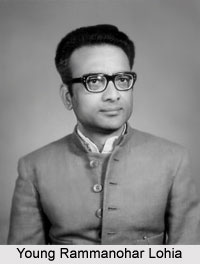 Rammanohar Lohia was born in the year 1910, and his father, Heeralal, was a merchant in Faizabad, in the Indian state of Uttar Pradesh. Ram Manohar`s mother died when he was two years old, and as a result he was brought up by his grandmother. His father was a devoted follower of Mahatma Gandhi. Ram Manohar saw Gandhi for the first time when he was only nine years old. The Indian National Congress held its plenary session in 1923 at Gaya in Bihar. Little Lohia was a Congress volunteer there. He also attended the 1926 session at Gawahati in Assam.
Rammanohar Lohia was born in the year 1910, and his father, Heeralal, was a merchant in Faizabad, in the Indian state of Uttar Pradesh. Ram Manohar`s mother died when he was two years old, and as a result he was brought up by his grandmother. His father was a devoted follower of Mahatma Gandhi. Ram Manohar saw Gandhi for the first time when he was only nine years old. The Indian National Congress held its plenary session in 1923 at Gaya in Bihar. Little Lohia was a Congress volunteer there. He also attended the 1926 session at Gawahati in Assam.
Lohia received his education in Mumbai, Varanasi and Kolkata. He passed the Metriculation Examination in the first class in 1925. After a two-year course at Benares Hindu University, he joined the Vidyasagar College in Kolkata, in the state of present day West Bengal. In 1929 he passed his Bachelor of Arts with Honours in English. Even in his student days he was attracted towards political agitation. He went to Germany for higher studies. Hitler was in power at that time. Lohia wrote his doctoral thesis. In Berlin University; his subject was the Salt Satyagraha in India. He was awarded the Doctorate in both Economics and Political Science. He returned to India in 1932.
The Satyagraha or Disobedience Movement launched by Gandhi was spreading throughout the country. Lohia plunged into the movement. The reward he got was imprisonment. Just then, the younger members of the Congress Party began to feel that the elders were not moving fast enough. Some of those youngsters had been imprisoned in the Nasik Road Jail. They had great compassion for the poor, the peasantry and the working class. These youngsters were determined to strive for the cause of such people. So they formed a youth wing in the Congress and called it the Congress Socialist Party. Among the founders of this Party were such stalwarts as Jayaprakash Narayan, Rammanohar Lohia, Yusuf Meherally, Achut Patwardhan, Ashok Mehta, Kamaladevi Chattopadhyaya and Acharya Narendra Deva. These people dreamt of building a nation for the toiling millions. In order to achieve this, they decided to put an end to the British rule.
Lohia became the editor of a periodical the "Congress Socialist`. With his western education, Lohia was very well versed in international affairs. The Congress established a new branch for external affairs. Lohia had to look after its administration. Lohia made it possible for the Congress to have contact with all the progressive thinkers of different nations of the world. He opened a separate cell in order to protect the interests of Indians abroad.




















